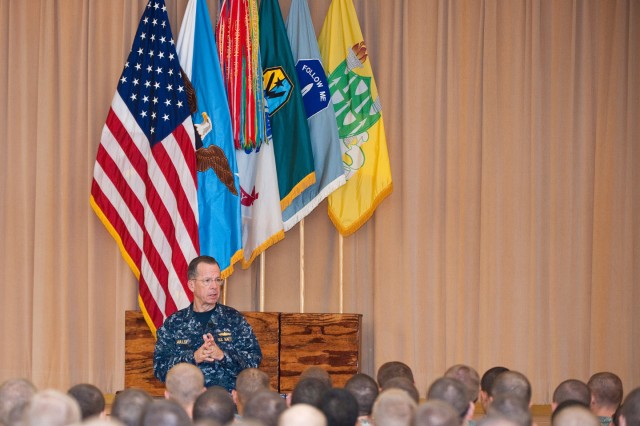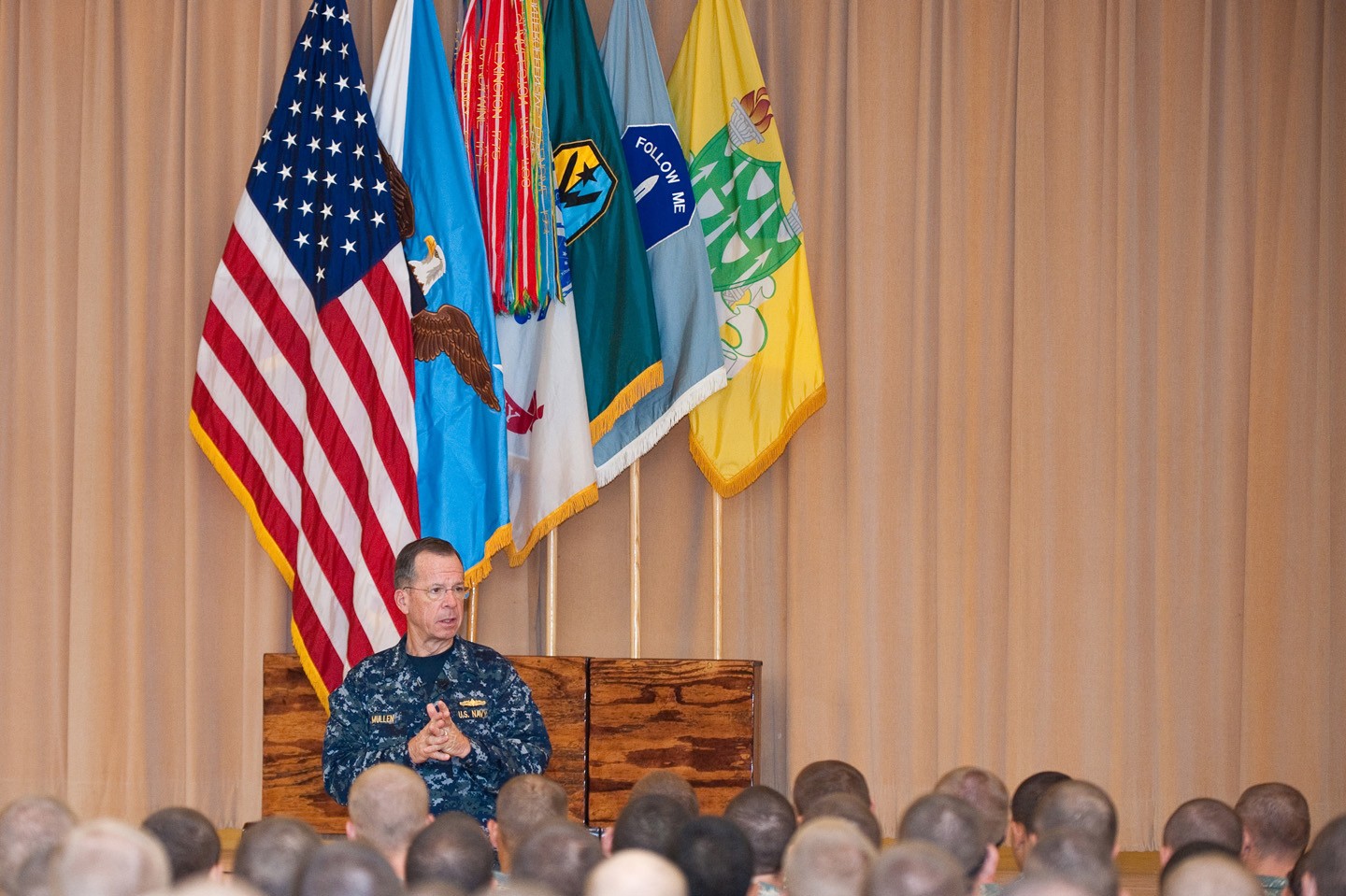FORT BENNING, Ga. - Adm. Mike Mullen discussed various hot spots around the globe during his June 4 town hall meeting on Sand Hill.
The Joint Chiefs of Staff chairman fielded questions from basic trainees, Soldiers in one station unit training and their cadre on a wide range of issues - spanning operations in Afghanistan and Iraq to potential threats from Iran, North Korea and China.
Mullen said it's an "extraordinary time" to be serving in the U.S. military, with the war on terrorism being waged along two fronts in Afghanistan and Iraq. The deployment tempo, however, is expected to slow for all troops except the Special Forces, as defense leaders aim to double the amount of time between downrange tours.
"We can see our deployment future pretty clearly," the senior U.S. military officer said. "Over the next couple of years, the pace will slow to a point where we'll be able to stay home twice as long as we've been deployed ... We're very focused on creating more dwell time and looking for ways to relieve the stress on individuals and their families.
"But the pace is not going to slow down too much. We're going to stay busy."
Still, plotting an exact roadmap for U.S. forces and the two campaigns is less certain, Mullen said.
"The point is we need to be ready ... with a broad range of capabilities," he told the Soldiers.
Afghanistan stability'
Asked by a Soldier how close coalition forces are to securing the situation in Afghanistan, the admiral said it's difficult to pinpoint, but added there must be military and civilian components to any long-term solution.
Mullen said he expects violence levels to continue increasing this year. "We're headed in the right direction, but it's a tough fight," he said.
In February, the U.S. military launched a successful operation around Marjah in Helmand province. He said it has aided stability but the gains aren't "irreversible."
Mullen said the U.S. is now shaping a big mission in Kandahar, which he called the home of the insurgency.
"Through the end of this year and probably beyond, we will be conducting operations in and around Kandahar," he said. "Kandahar is as significant in Afghanistan as Baghdad was to Iraq in the surge in the (2007) time frame. It's not the same kind of operation, but it is as significant."
This summer, U.S. troop levels will rise slightly, from 94,000 to 98,000, Mullen said.
"We've got the right strategy, we've got the right resources, we've got the right leaders there," he said, "so I'm actually cautiously optimistic about where we are and where we're headed. But it's an enormously complex place."
'It's now up to the Iraqi people'
The drawdown of U.S. forces in Iraq, meanwhile, will continue over the summer, the chairman said. About 90,000 troops are currently in country and the number is expected to be at 50,000 by the end of August.
Just a couple of years ago, the picture was much bleaker, Mullen said.
"It was going south rapidly," he said. "(But) the surge created an opportunity for 26 million people that wasn't there before."
Iraqi politicians are in control and the nation has been "recertified as free and fair," Mullen said.
"It's now up to the Iraqi people and their government to succeed," he said. "That couldn't have happened without the U.S. military."
Great concern about Iran
Mullen said Iran routinely supports international terrorism while attempting to undo gains in Iraq. The regime has been influential in Afghanistan to a certain degree, and its backing of organizations such as Hamas and Hezbollah is well known.
The country also remains on a path to developing nuclear weapons, which would be "incredibly destabilizing in a region of the world that is already very unstable," the chairman said.
If Iran achieves that capability, Mullen said it could ignite a nuclear-arms race in the Middle East.
Diplomatic measures and U.N. sanctions are being considered to continue isolating Iran from the rest of the world, he said.
"Hopefully, it gets them to the point where they make a decision that having nuclear weapons is higher risk than not having nuclear weapons," he said.
But at this juncture, the Islamic nation hasn't responded positively to diplomatic or international pressure to abandon its nuclear ambitions, Mullen said.
"Iran is a country that I worry a great deal about," he said.
U.S.-China relations
A military relationship is critical to improving accord between the U.S. and China and can't be overstated, Mullen said, but the track record has been dubious.
"We need to have that," he said. "It has gone through fits and starts. I've engaged several of their leaders in recent years ... We don't have to agree on everything - we certainly don't, but to improve that relationship so that we can have a better understanding of what our priorities are, of creating a sustained secure environment, certainly in that part of the world."
Defense Secretary Robert Gates criticized China's military for thwarting efforts at better relations and refusing Pentagon requests to visit the communist nation during his recent trip to Asia. He said ties have been better on other government fronts.
"China is a global power, and there are global implications for China's lack of transparency in what they're doing with their defense investment," Mullen said. "From what I see ... I would certainly agree with his assessment that it is the military that's holding us back."
Tensions on Korean Peninsula
Tensions have flared this year between North and South Korea. The admiral discussed a late March incident in which 46 South Korean sailors were killed when North Korea torpedoed a South Korean naval ship near the disputed sea border.
"It was a despicable act and one that everyone needs to do all they can to make sure doesn't happen again," Mullen said. "We don't need a conflict in that part of the world. That said, we can't tolerate leaders who just go around doing those kinds of things."
Right now, the U.S. wants to resolve the issue through diplomatic and political channels, he said.
"North Korea is a country that is very unpredictable, very much isolated from the world, (but) it's in a part of the world where we want stability, with a growing power in China," he said.


Social Sharing